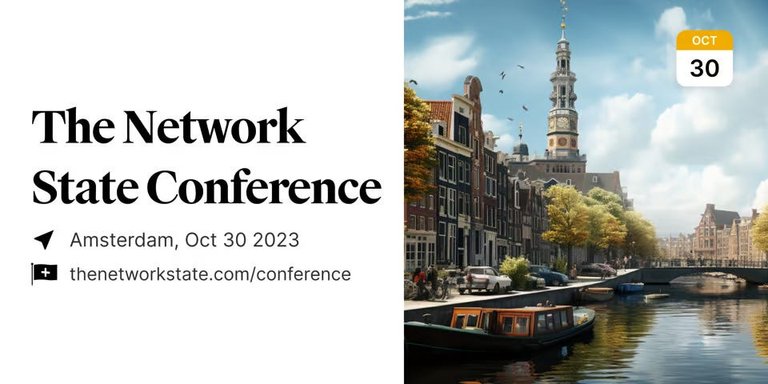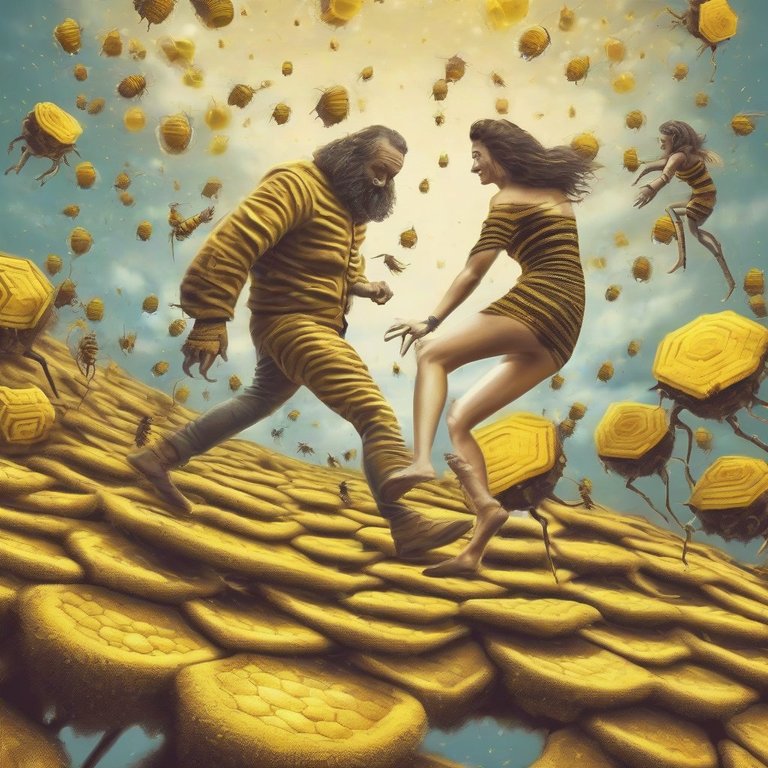I just experienced two interesting events online. Two days ago, there was a Network State Conference held in Amsterdam. I had the opportunity to catch it live on Balaji's YT channel, and boy... that was such a shitshow! People in the chat were embarrassed with the level of talks. We had a running joke that the best part of the whole conference was this live chat. I watched the first half of event so I could have be surprised later, but I just couldn't stand the whole event. This limited attendence brought be these conclusions. Need for decentralized network communities is huge. People are interested and want to learn more.

Meanwhile, the conference organized by Balaji himself was more of a marketing event filled with grifters, people from the real estate, and modern hippies/digital nomads. You know, kind of a "buy my stuff" event but with start-ups. While I have nothing against hippie communities (as long as they don't gentrify my neighborhood) or business people. It was miles, miles away from anything connected with the Network State shape or form. There were these old-school seasteading ideas, ecovillages, construction solutions, and even some blockchain people, but there was nobody really talking about how this blockchain thing should be built in a sustainable way, in a way which works. There was nothing (or veryy little) about infrastructure needed to create a state. I missed Hive so much there! Yes, plumbing is not as sexy as digital nomads dancing in Costa Rica.
Literally, every community in history built as an alternative to the dominant system failed. If it didn't implode because of bad leadership, it was not anti-fragile and ultimately attacked and defeated by outside forces. This is a serious lesson for anybody considering creating a sustainable solution for communities. With the advance of cryptography, decentralized governance, and information technology, for the first time in history, we have all the tools needed to build a sustainable, anti-fragile Network State. I mean, we need to have a solid ground to dance on.

People in the chat seemed to get that. Only with solid "Network" architecture can we think about creating a "State." The way to crowdsourcing the country might be very long if necessary. According to Balaji's words, Network State is not a manual but more of a toolbox. We are free to take whatever we want and build with it. At this point, we can't say what shape a sustainable Network State will take. We are on the frontier of how communities cooperate and organize, and we are free to create this reality unbound to any historical definitions.
Of course, Hive is a protocol that mighe be great for Network States to be build on; it's perfect for that. Can't this statehood be decentralized and sort of anarchistic though? As long as infrastructure and community cater to our fundamental human needs, it's enough to have this minimalistic structure in place. Network States might be not states at all. I mean the whole suits and violence thing might be just obsolete. And what's left is human rights, cooperation, fun and connecting with others within Network.
Claiming Network State is not some grand declaration, not some positioning against other structures. It's a way for people to have a frame of reference. It's also a way for the whole community to have some marketing narrative and identity. In my opinion, we desperately need that for Hive.
There are thousands of people gathered around Balaji's concept with whom we could make a great match here. Claiming Network State is a way of saying, hey, we have very similar ideas and our toolkit here might be of use for you.

The second online event I attended was Hive Town Hall X Space. This one was much more interesting to listen and great way to increase Hive visibility and cooperation between frontends. I'd like to see it more decentralised in the future though. Let's go straght to the meat. I'm aware that the current idea for promotion is marketing of individual projects and this business attitude. Hive growth is suppose to be just a side effect. It's great Hive has this fractal nature, we can have communities within communities, and communities within businesses. And in theory it could have worked, right? However, without VC money and Web 2.0 presence, we start handicapped at the beginning. Even if it allows running your business freely, Hive is (luckily) not a project of a business focus primarly. We don't have leverage to compete with dApps on other chains. Furthermore, Hive is not than just projects on Hive. It's much more, our focus on community and distribution is unique, something where this chain really shines brightly! We need to take that into account when we think about marketing. But it needs to be clever. Word community is so worn out... This matter is important not only for me, the need for a consistent narrative about Hive was voiced during the town hall many times.
So my call here would be this: read at least first chapters of Balaji's book. Decided by yourself if Hive fits it. If you find it convincing just talk about Hive as a Network State. Claim it by yourself. Simply. At the end, it's permissionless, isn't it?
I don't need to read Balaji's book, I practically wrote the book myself over the years, if anyone cares to read my blog. Suffice to recall here posts like
"How I loved to stop worrying and love the Bid Bots" and "Revisiting Steemland ..." and others
Wow, it seems to be impressing library! That would be some opinion of great value to have this writings confronted with Balaji's vision. What he provides is more of a philosophical and technical background for a process of digital nation forming, community-wise. Monetary and economic are important aspects too.
Thanks for your links. I found some words that drew my atention :)
Thanks for reading! I've reflected quite extensively on the social, cultural and philosophical aspects in other writings such as this one: "Steem Social Lab: we need a "charter"" and, more recently, this one: "Hive: waiting for Ryoshi"
Following for later reading.
Thanks, and don't hesitate to comment!
I myself have been working on the base platform for 11 months and I have never seen such a strong project. People who are here are very supportive of each other and new people so that they can also join this platform. Being able to work on the farm is not possible at all on other platforms.
I've reviewed some of the discussions on this topic and was taken aback by the simplistic nature of the conversation. The idea of evolving a loose digital community into a comprehensive digital nation seems improbable, even with the most avant-garde perspective. Instead of pioneering new digital landscapes, many are simply returning to traditional communal living in the physical world. Starting with an ambitious vision like "The Network State" and then devolving into basic communal living without recognizing the contradiction is astonishing.
Hive, with its unique history and challenges, may not be the perfect platform for a Network State. However, perhaps there's potential for something to thrive on its L2.
At the core of a state is identity. A logical first step might be to establish a solid foundation for digital identity. Once that's achieved, we can consider how to expand that digital realm. A genuine Network State would require each wallet/account to possess a unique personal, cultural, and state identity. The base layer's neutrality should be reinstated, governance processes optimized for agility, and the overall ethos of the on-chain experience should align with a unified vision. That's my perspective on it.
Identity is crucial part, but it's rooted even deeper. It may come from various features we consider identical with others. However it's really strong when it's rooted in values. In case of blockchain, we choose to use one chain or another, and these values are coded into blockchain itself. Tokenomics, distribution, governance, rate of inflation, it all speaks of values held by community. Unwritten rules of Hive are natural consequence of this architecture and ar inevitable for sustainability of community. Of course, people perceive these values individually, and this percetion may vary, but it's similar enough to create identity around it. That's how I feel it. Meeting other Hivers IRL was a breakthrough for me, I instantly knew we have something in common, and it only deepened after talking to people more.
Another aspect on top of common values is alignment of incentives, it's beneficial for all parties involved to cooperate within that state. And at the same time nobody is being coerced into doing anything. And within certain Overton window (its inevitable IMO, what's crucial is making it wider than elsewhere) everybody is free to hold and express any opinion.
Also what I mean in my post, it doesn't need to be solidified in any form of official body, it happens by itself thanks to proper infrastruture provided. The most important part is to aknowledge the process and use the narrative for the benefit of the community. The whole process might take decades to fully unfold.
States historically operate based on strong ties of identity and allegiance. Currently, we observe conflicts rooted in deep-seated affiliations with nation-states. Consider why Palestinians hold onto Gaza, Ukrainians fiercely protect their eastern borders, or Taiwan maintains its distinct identity separate from China. These stances are rooted in national and cultural identity intertwined with their statehood.
I recognize that this reality isn't always palatable. Indeed, the empirical truth can often be a stark reflection of our most basic human instincts, which can be disheartening. Yet, we're constantly in a dance of negotiation with our environment to understand and affirm our identities. Our value systems, which shape how we perceive and navigate our lives, play a significant role in this process. Think of consciousness as a vector traversing space and time—it begins internally and then extends outward.
The first digital community to effectively address the challenges of identity in decentralized and fragmented systems will be on the cutting edge of a new era in digital statehood.
--- A Mindgame ---
Q: What will make you say this:
I will die to protect MyDigitalState. (even if it's only partial death, financial or reputation)
A: If it's self defense.
Would you agree?
Thought provoking post, I will reread and add some more thoughts later.
Congratulations @deepresearch! You have completed the following achievement on the Hive blockchain And have been rewarded with New badge(s)
Your next target is to reach 400 posts.
Your next target is to reach 45000 upvotes.
You can view your badges on your board and compare yourself to others in the Ranking
If you no longer want to receive notifications, reply to this comment with the word
STOPTo support your work, I also upvoted your post!
Check out our last posts:
Congratulations @deepresearch! You received a personal badge!
Participate in the next Power Up Day and try to power-up more HIVE to get a bigger Power-Bee.
May the Hive Power be with you!
You can view your badges on your board and compare yourself to others in the Ranking
Check out our last posts: